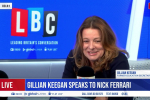It is a pleasure to follow the hon. Member for Swansea East (Carolyn Harris), and indeed all the Members who have spoken so movingly today. The holocaust is a subject that is difficult to approach. It is tough to find the right words, but it is even more difficult knowing that this is not some distant event that is completely removed from how we conduct ourselves today. Even with the effects still so prevalent, antisemitism continues to raise its ugly head and is trying to infect the political mainstream once again.
For Holocaust Memorial Day this year, Parliament will play host next Monday to the production of “PUSH”, a holocaust opera that was first performed in Chichester Cathedral to mark last year’s Holocaust Memorial Day. The performance centres on the true story of Simon Gronowski, who, as the title suggests, was quite literally pushed from a moving train by his mother in Belgium in 1943. That train was destined for the Auschwitz concentration camp, and Simon was one of the 1,631 Jews selected for transportation to the gas chambers that day. It was only through the actions of three brave resistance fighters that the train transporting Simon was halted en route. That was the first and only time that a transportation train was stopped on its way to a concentration camp, and 223 people tried to escape the train, although only 108 were successful. They included Simon, thanks to the courageous actions of his mother. Both she and Simon’s sister, Ita, stayed on the train, and they died in the gas chambers of Auschwitz.
We will have the honour and privilege of welcoming Simon to the House when Howard Moody and his choir put on their production next Monday in Speaker’s House. Members, peers and rabbis have been invited to come and watch the production, and it is particularly apt that the theme of this year’s Holocaust Memorial Day is Torn from Home. I would like to pay tribute to the Chichester marks Holocaust Memorial Day Committee, particularly Councillor Martyn Bell, the mayor, and Councillor Clare Apel, who have helped to put the production together.
Listening to Simon’s story, and his interviews, we cannot help but be inspired by his faith in the goodness of humanity. In the years that followed the war, the collaborator who put him and his family on that train was racked with guilt. As he lay on his deathbed, he asked Simon for his forgiveness, and in an act of astonishing humanity, Simon forgave him. The holocaust has shown the darkest, cruellest aspects of the human character. I saw this for myself when I visited Yad Vashem. I was so moved by the actions of complete strangers who had risked their own lives to keep Jewish people safe from the Nazis and who are remembered there.
The mass graves of Auschwitz and the other concentration camps marked the end of a gradual process. The holocaust did not begin with the gas chambers; it started with the legitimisation of antisemitism in mainstream debate. It was instigated by making “different” wrong. The fact that Dr Joseph Goebbels and the other Nazis were able to spin lies and manipulate fact to legitimise their racist, tyrannical agenda should serve as a warning to us all today. The Nazis learned how to make the most of the new media capability of the day—the radio—and that is happening again. In so many ways, the advent of fake news on social media platforms today is a chilling echo of how a lie can be halfway around the world before the truth has its shoes on.
The holocaust began with hate speeches and radio broadcasts, but it then developed into legal discrimination against Jewish people through the so-called Nuremberg laws. Permission was given for violence to be visited on Jewish minorities across Europe. It was incentivised by the Nazis, who offered rewards for betraying Jews in hiding and then stole their property. It ended with the final solution: the gas chambers of the concentration camps.
We in the Chamber today have something that Jewish people and other minorities did not have during that period: a voice. We must use it and retell their stories to ensure that we call out antisemitism wherever we find it and to ensure that this tragedy never happens again. Simon’s story shows us that we can be better as human beings, and that humanity, freedom, tolerance, forgiveness and respect are noble values that each one of us has a duty to uphold.

